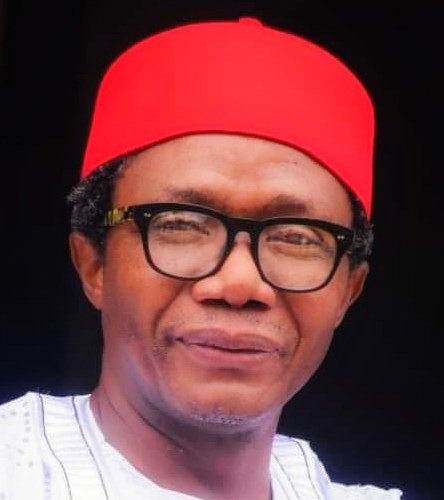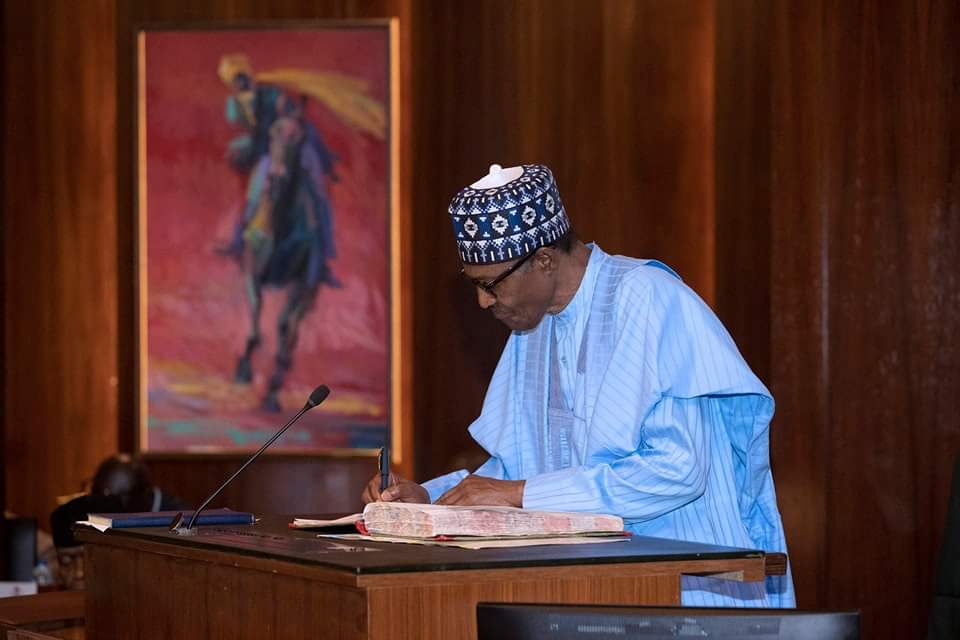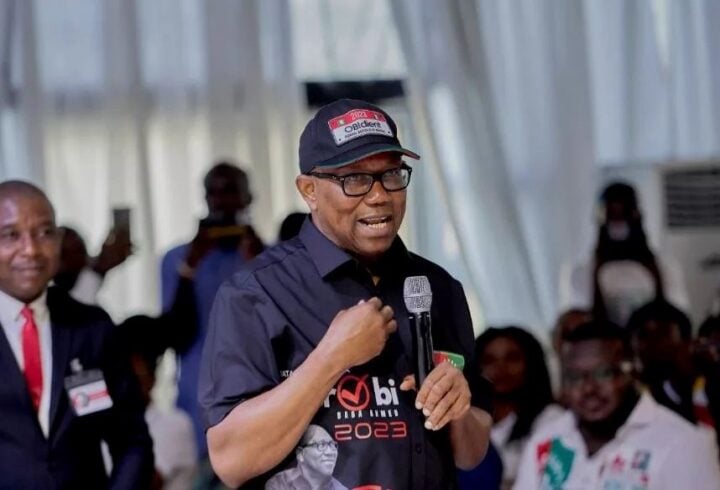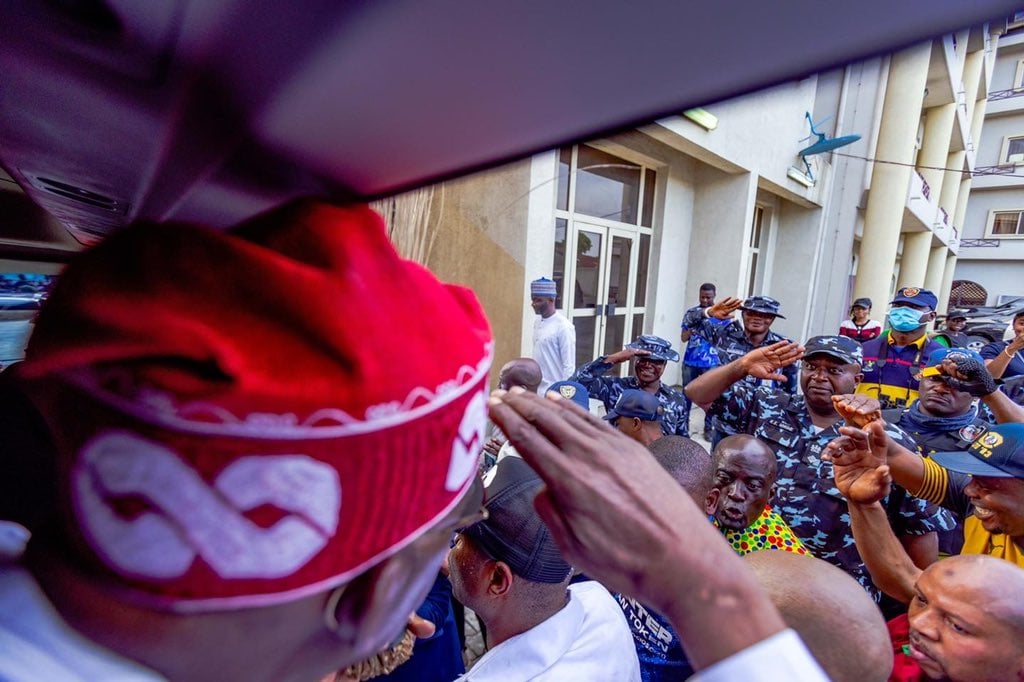PRESIDENT BUHARI SWEARS-IN 7 ICPC BOARD MEMBERS 0A President Muhammadu Buhari during the inauguration of board members of the independent Corrupt Practices and Other Related Offences Commission (ICPC) at the Council Chambers. PHOTO; SUNDAY AGHAEZE. MARCH 15TH 2023
In life, it is not the much said that matters but the much done of the much said. That’s what President Muhammadu Buhari just demonstrated by signing some devolution of powers into law.
Restoration of federalism to Nigeria as agreed between the nation’s founding fathers (Zik, Awo, Ahmadu Bello, et al) and colonial Britain is what the deafening clamour for restructuring is all about. The 1999 Constitution could be the worst in the nation’s annals for imposing a unitary system in a federal environment, with 68 key items on the Federal List compared to a little over 30 flimsy and sundry items contained in the Concurrent List.
When the powers that confer socioeconomic autonomy to a federating unit as obtained in a true federation are considered, one would see that virtually all of them are concentrated and consolidated on the Exclusive List – Power/Electricity, State police, Ports, Railway, Solid minerals, Local government, State Assembly, Judiciary autonomy, and many more.
Under Dr Goodluck Jonathan as president, most of these issues were addressed and passed in the last amendment, which he was to sign into law just before handing over, as is the case with Buhari at the moment. Jonathan refused to sign the amendments even though NASS had passed them and the concurrence affirmation by 24 state houses of assembly had also been passed. These were necessary devolution items needed in the constitutional alterations, which must be moved from the Exclusive List to the Concurrent List if Nigeria will be a federation indeed again. A reliable source said that Jonathan signed but used Tippex correction fluid to erase his signature for reasons best known to him.
Advertisement
During the Obasanjo years, no constitutional alteration bill succeeded. The one that would have seen the light of day, some lawmakers smuggled the 3rd term clause into it for the benefit of the same Obasanjo. That single clandestine move killed the move to alter the 1999 Constitution to devolve powers to make the States truly federating units.
One had expected that the nation could have attained 100% restoration to true federalism between Obasanjo and Jonathan since the current constitutional arrangement disfavoured the south more. But the two Presidents from southern Nigeria divide frittered away their combined 14 years in power and couldn’t even move a single devolution item from the Exclusive List to the Concurrent List. And it took a Buhari, who the odds never favoured to sign the first significant devolution of powers into law thus succeeding where others before him woefully failed and thus wrote his name in gold.
What just happened reminds one of a certain parable in the Bible. Matt. 21:28-32 is about two brothers whose father tells them to go work in his vineyard. One tells his father that he will but doesn’t do it. The other tells his father that he won’t go but ends up working all day among the vines. Jesus then asks the question: “Which of the two did the will of his father?” The answer is clear: the one who worked, though initially refusing to do so.
Advertisement
This reminds us also that actions speak louder than words. Many Nigerian leaders make statements declaring they would restructure but never did when given the opportunity.
Though it is still a far cry as certain powers such as fiscal federalism, state police, ports, solid minerals, and some others are not part of what Buhari signed into law, the four items that passed are quite a milestone and will start the process for regional integration and creation of true economic hobs for regional and national development. There can’t be a greater parting gift for a president whose administration brought so much hardship, escalated insecurity, and imposed debilitating poverty and most recently, a most controversial presidential election denounced by both Nigerians and the international community. This decision to devolve key powers to states is therefore redemptive to the President and suffering credibility.
Let us take a look at the alterations that have given the states some key powers as federating units. Buhari has signed 16 constitutional amendment bills; states can now generate, distribute electricity, and own railways and state assemblies/judiciary now have financial autonomy; presidents and governors must appoint ministers and commissioners within 60 days among others.
With the Fifth Alteration Bill No. 33, Devolution of Powers (National Grid System), Nigeria’s 36 states are allowed to generate, transmit, and distribute electricity in areas covered by the national grid. This is perhaps the most important.
Advertisement
Another granted right to the state governments is the power to establish their railway service – Fifth Alteration Bill No. 32, the Devolution of Powers, Railways. With this, the railway moves from the Exclusive Legislative List to the concurrent list. With this law, a zone like the Southeast can put in place a railway network that will ring up the five Southeast states.
Finally, changing prisons to correctional service and re-designate correctional service in the Concurrent list is the fourth right signed away from the Exclusive List by the President. States can now set up their Prisons to keep offenders generated by them. This will lead to a drastic decongestion of federal prisons.
Summarily, these amendments are key devolutions and represent a major shift in the nation’s federal structure. Since the two twin problems of Nigeria are leadership and structure, any fundamental alteration of the nation’s structure is a solution to the nation’s problems.
What is more, there is no separation of powers in the states for the reason that there is no autonomy of States’ Houses of Assembly and State Judiciary. This is now resolved with these signed bills and state assemblies can now stand up to the state governors who have been enjoying absolute powers and corrupted by it since 1999.
Advertisement
Thank you, Mr President, for the courage and the precedence. One can only hope that your successor will take it a notch higher by signing more key items away from the Exclusive List to the Concurrent List and fully restoring the nation to federalism and kick start true integration and development.
Mefor is a senior fellow of The Abuja School of Social and Political Thought. He can be reached via +234-9056424375 or [email protected]. He tweets @DrLawMefor1
Advertisement
Views expressed by contributors are strictly personal and not of TheCable.
Add a comment







